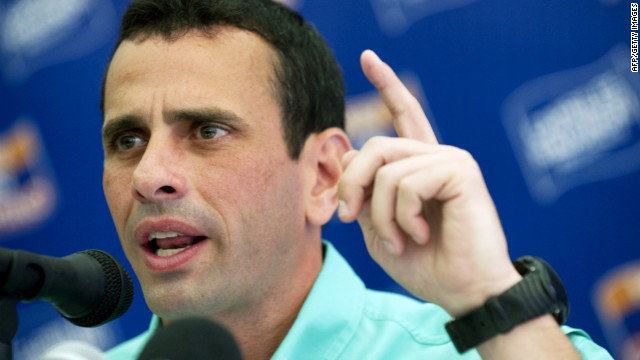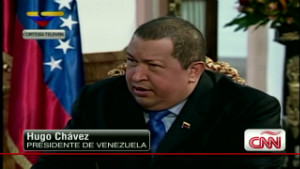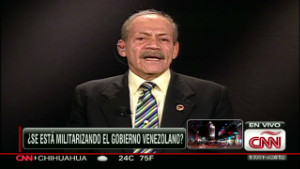Capriles cruises to victory in Venezuela's primary election
February 13, 2012 -- Updated 1206 GMT (2006 HKT)

Venezuelan
candidate of the opposition Democratic Unity coalition for the upcoming
primary elections, Henrique Capriles Radonski, delivers a speech during
press conference in Caracas on February 7, 2012.
STORY HIGHLIGHTS
- NEW: Henrique Capriles: "Today, our people spoke"
- Pablo Perez garners some 30% of the vote
- Capriles wins 62% of the vote
- Close to 3 million people cast ballots
Capriles, 39, led in polls heading into the election. He cast himself himself as a center-left candidate and sought to appeal to voters across the political spectrum.
"Today, our people spoke," he told crowds of cheering supporters late Sunday. Calling for unity, he promised to work for all Venezuelans.
Capriles won roughly 1.8 million of the approximately 2.9 votes cast in the country, according to Teresa Albanes, president of the electoral commission of an opposition coalition group.
Capriles' closet competitor, Zulia state Gov. Pablo Perez, garnered some 30% of the vote, she said.
 Hugo Chávez y la reelección
Hugo Chávez y la reelección
 ¿Venezuela militarizada?
¿Venezuela militarizada?
CNN iReporters sent pictures of long lines snaking in and around buildings in Caracas, Valencia and Maracay.
Perez and the four other opposition contenders for the presidential candidacy have agreed on one thing: supporting whoever won the primary.
The unified front could be a key weapon in the political battle leading up to October's presidential election, analysts say.
"The opposition realized that if they are not united, if they divide the vote, they can never beat Chavez," said Federico Welsch, a political science professor at the Simon Bolivar University in Caracas, prior to the vote. "After Sunday, President Chavez will have an adversary with a face and a name. ... This time it seems like the opposition has a real possibility of winning. It's not a very high probability, but there's a chance."
Chavez's supporters have slammed the opposition coalition, saying there's no doubt the incumbent president will triumph in October.
The candidates' hatred of Chavez is the only thing pulling them together, Rep. Jesus Cepeda said in an interview broadcast on state television last month.
"Hatred is the most detestable human emotion. And when it lodges inside people, it consumes and corrupts them to a point where they can't even think. The opposition is full of resentment," said Cepeda, a lawmaker from Chavez's United Socialist Party of Venezuela.
Beyond a shared goal of unseating Chavez, there were other issues at play in the primary, including what to do about high levels of public spending, widespread security problems and inadequate health care, said Jose Vicente Carrasquero, who is also a political science professor at the Simon Bolivar University and who also spoke ahead of the vote.
"Chavez is running for re-election for the fourth time, and these are the same problems that he did not resolve the three previous times," Carrasquero said.
Chavez has repeatedly hailed the successes of his government, arguing that poverty has declined and social programs have increased.
The president has said he is confident he will win October's election, but pledged to step aside if he doesn't.
"If I lose the elections on October 7, I would be the first to recognize it and I would hand over the government and I would call on civil servants and the military, from the most moderate to the most radical, to obey the mandate of the people," Chavez said last month.
Capriles, a former tax attorney, was the mayor of Boruta, a Caracas suburb, before winning the governorship of Miranda, which adjoins the Venezuelan capital. He was also the youngest vice president of the now defunct Venezuelan Congress.
CNN's Patricia Janiot and journalist Osmary
Hernandez in Caracas and CNN's Catherine E. Shoichet, Claudia Dominguez
and Rafael Romo in Atlanta and Rafael Fuenmayor in Miami contributed to
this report.
No comments:
Post a Comment